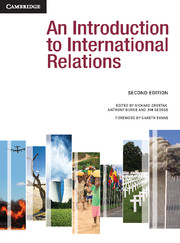Book contents
- Frontmatter
- Contents
- Tables, Figures and Boxes
- Contributors
- Preface and acknowledgements
- An Introduction to International Relations: The origins and changing agendas of a discipline
- 1 Theories of International Relations
- 2 The Traditional Agenda
- 3 The New Agenda
- Glossary of Terms
- Bibliography
- Index
- References
An Introduction to International Relations: The origins and changing agendas of a discipline
- Frontmatter
- Contents
- Tables, Figures and Boxes
- Contributors
- Preface and acknowledgements
- An Introduction to International Relations: The origins and changing agendas of a discipline
- 1 Theories of International Relations
- 2 The Traditional Agenda
- 3 The New Agenda
- Glossary of Terms
- Bibliography
- Index
- References
Summary
Introduction
This Introduction begins by outlining what is meant by international relations. Second, it tells the story of how and why the study of international relations emerged when it did in the early twentieth century. Knowing something about the discipline’s origins does not tell us everything we need to know about international relations today, but it will help us to understand the legacy left by the discipline’s original purpose and by older traditions of thought. Third, it sketches the contours of the changing agenda of international relations, a shift that some scholars describe as a transition from international relations to world politics or from the ‘traditional’ to the ‘new’ agenda. Although there can be little doubt that as political reality has changed new theoretical and conceptual tools have become necessary to grasp it, we should not assume that the myriad changes to our world have rendered the ‘traditional’ agenda and its theories obsolete. Far from it; the ‘new’ agenda, as we shall see, supplements but does not supplant the ‘traditional’ agenda. It is now more important than ever to consider the relationships between ‘traditional’ and ‘new’ theories and issues. This textbook is intended to help you think about these relationships.
What is International Relations?
Every day the global news media carry stories of events involving foreign governments and their populations. Usually featured under the heading of ‘international affairs’ or ‘world news’, these stories all too frequently tell of political violence, lives and livelihoods lost, human rights violated, infrastructure damaged, and hopes for the restoration of peace and prosperity dashed. War rather than peace makes the news headlines, and understandably so, because the violent conflict of war so visibly ravages human societies. ‘If it bleeds, it leads’, as the cynical media adage goes.
- Type
- Chapter
- Information
- An Introduction to International Relations , pp. 1 - 20Publisher: Cambridge University PressPrint publication year: 2011
References
- 1
- Cited by



